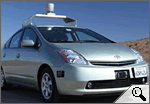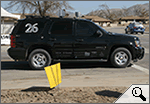|
|
|
 |
 |
 > The reasons behind it > Driverless car races > A future reality? dimarts, 19 d'octubre de 2010
Driverless cars that run by themselves without anyone driving them. Science fiction? No, at least not for Google, the internet's leading search engine.
According to its official blog, Google has developed the technology to allow cars to be driven by themselves. In fact, it's been trying out this new technology for some time on a fleet of cars that have already notched up 225,000 kilometres on highways and city streets in San Francisco, Hollywood, Santa Monica and other cities in the State of California. These driverless cars are equipped with video cameras, laser and radar sensors, as well as highly detailed route maps (previously compiled by conventional, manually driven cars), all of which allow the cars to drive normally. The tests are carried out with a driver inside the car, ready to take control if necessary, and an engineer in charge of controlling the car's computer programme.
The reasons behind itAccording to Google, the aims of developing driverless cars are three-fold: to improve the quality of the environment, to create more free time for drivers (if they don't have to drive, they have more time to do other things) and, above all, to prevent accidents. According to the World Health Organisation, traffic accidents are responsible for 1.2 million deaths every year, and Google believes that the wide-spread use of driverless cars could cut this figure, possibly by up to half.
Driverless car racesDriverless cars aren't a totally new invention. In the last few years for example, the United States Defense Advanced Research Projects Agency (DARPA), has organised a driverless car race called the Urban Challenge. Another initiative, the Vislab Intercontinental Autonomous Challenge, is currently underway. Its ambitious goal is to travel in driverless cars from Parma (Italy), to Shanghai (China). The trip is estimated to end on 28 October.
A future reality?
+ Google admits that the project is still in its very early stages.
Whatever happens, it's still not clear if autonomous cars will become widespread in the mid-term. Although Google professes its optimism about technology's ability to further society, the company also admits that the project is still in its very early stages. According to the New York Times, the most optimistic forecasts predict that this type of car won't be on the market for another eight years. Only time will tell...
|
Investiga

> Filmant un cotxe automàtic de Google.

> Els cotxes de Google han superat la prova del sinuós Lombard Street (San Francisco).

> L'envit d'anar d'Itàlia a la Xina amb cotxe automàtic.
I també...
- Una passejada amb un cotxe que ningú no mena.
- 'El cotxe fantàstic' ('Knight Rider'), una sèrie mítica.
- Article sobre els cotxes de Google.
Portada |
Europa Press |
El Punt |
La premsa |
Especials |
Diari de l'escola |
LesFinances.info |
Editorials |
Mail obert |
Els blocs |
Lletres
Tecnologia i ciència | Solidaritat | Cap de 7mana | Campus | El 9 | Presència | Fòrums | Enquestes | Xat | Correu
Traductor | Edicions en Pdf | Wap-pda | Biblioteca | Lletra més grossa
Tecnologia i ciència | Solidaritat | Cap de 7mana | Campus | El 9 | Presència | Fòrums | Enquestes | Xat | Correu
Traductor | Edicions en Pdf | Wap-pda | Biblioteca | Lletra més grossa
| Què és VilaWeb? Publicitat Mapa web Contacte | Una web de Partal, Maresma i Associats, S.L. |




